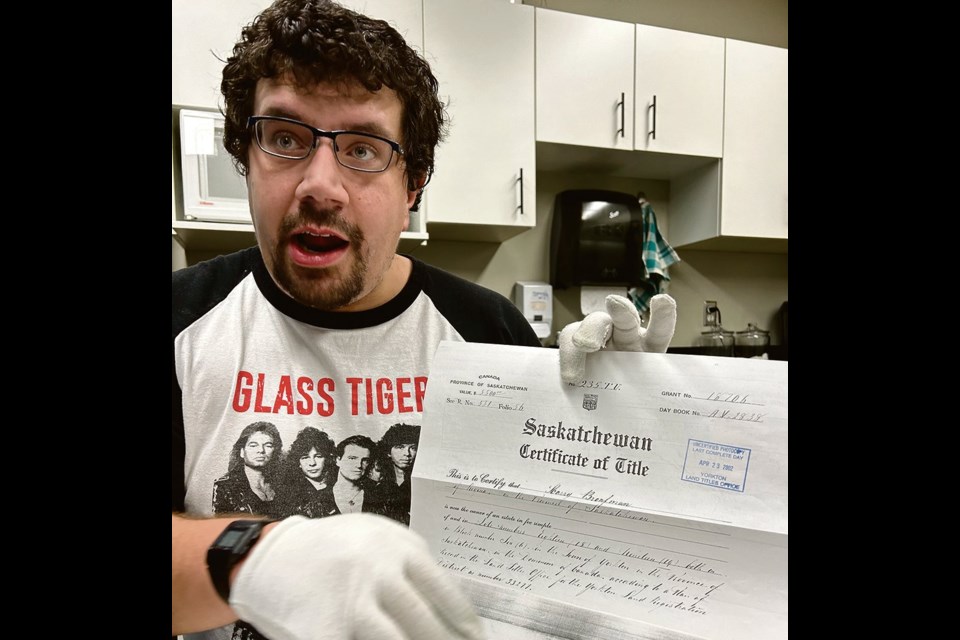WINNIPEG — Long before cameras, artists employed their talents to capture the truths we needed to confront.
What does the “Lower End of the Ileum, on the Tenth Day of Enteric Fever,” look like?
Thanks to a skilled penman, British parliamentarians of the mid-19th century knew. From within one of the thick tomes of the British Parliamentary Papers, out flops a coloured centrefold showing a ravaged gut in intriguing detail. Red-rimmed lesions plague a pink coil of human intestine. One can, perusing this image and accompanying testimony, imagine the suffering of one infected with typhoid fever.
“The First, Second and Third Reports of the Royal Commissioners on the Origin and Nature of the Cattle Plague with Minutes of Evidence and an Appendix,” it’s also contained in the British Parliamentary Papers (BPP), long, heavy shelves of the bound accounts providing the main floor of the University of Regina’s Archer library with ballast and a great resource on agricultural history.
A row of the BPP, stamped agriculture, caught my eye on a Thanksgiving weekend visit to the library while touring my 16-year-old daughter through the stacks and shelves.
We stopped and I spent a few minutes flipping through many a quaint and curious volume of forgotten agricultural lore, before I sensed a tapping, as of a teenager gently rapping, rapping at a distracted parent’s door.
This wasn’t my only recent brush with archival treasures lovingly tended by our society’s archivists. The day before I had been in the City of Yorkton archives, looking through their collection of early Bronfman liquor empire documents and materials with a fabulously dynamic archivist, Hayden DeGrow, who had spent the last couple days going through the files after I had contacted him.
There, amid a pile of land titles documents for 108 First Avenue going back to 1907, DeGrow could see a mystery between the words and dates and names and stamps for one of the most pleasant homes in Yorkton a century ago.
Why had a Toronto-based superintendent of branches for the Imperial Bank of Canada, responsible for providing housing for the managers posted to Yorkton, sold Harry Bronfman the house in 1923? Why had Bronfman apparently held on to the property until 1941, despite having moved from the city in the mid-1920s?
Who was this Bertha Segal, “wife of Sam Segal,” who bought the home and held it until 1970?
Just some funny and odd details within the sparse evidence that remains to prove that the world’s greatest liquor empire was deeply rooted in that small prairie city.
Wonderful stories live within these sorts of documents, sitting in files in cabinets, in boxes in library basements, within corporate collections and amid the piles of knowledge that universities curate.
Some of you might remember archives that I wrote as part of our ongoing celebration of The Western Producer’s 100th anniversary. Reporting that was a wonderful experience for an ex-graduate student of history, who abandoned dreams of becoming a historian for this life of newspaper scribbling.
There, in four boxes of collected materials sat so much about Stefansson, the “father of canola.” There were slides, official letters, documents, awards and newspaper clippings. Most touching to me was the substantial file of his responses to the many letters of congratulation he received for being named to the Order of Canada. As busy as the modest man was, he had time to compose individual responses to his well-wishers, who likely never expected them.
The University of Manitoba’s archivist, Brian Hubner, has provided me with more information on agricultural archives at the library, and I’m hoping to delve more deeply into some of those soon.
I feel honoured by the time DeGrow gave to me and the readers of The Western Producer by immersing himself for a week in the dusty material to find the stories within.
I’m proud of my first university for holding and keeping those British Parliamentary Papers on Agriculture, which I surely will pore through next time I’m in the Queen City. This time, however, I’ll make sure to give my 16 year old something suitable to occupy her attention, and give myself a couple of hours to sink deep into the records of old ag lore, as a pallid bust of Pallas broods over me.




